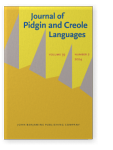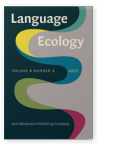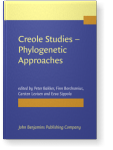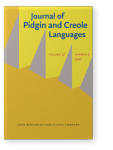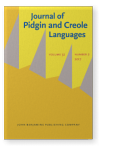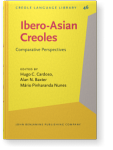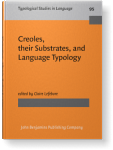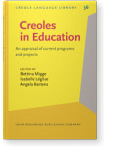Eeva M. Sippola
List of John Benjamins publications for which Eeva M. Sippola plays a role.
Journals
ISSN 2452-1949 | E-ISSN 2452-2147
Title
Creole Studies – Phylogenetic Approaches
Edited by Peter Bakker, Finn Borchsenius, Carsten Levisen and Eeva M. Sippola
[Not in series, 211] 2017. x, 414 pp.
Subjects Contact Linguistics | Creole studies | Historical linguistics | Theoretical linguistics
2022 The lexicon and creole formation: A reply to Jacobs & Parkvall (2020) Journal of Pidgin and Creole Languages 37:2, pp. 219–239 | Reply
There is disagreement as to the formation period of Chabacano, Philippine Creole Spanish. This article examines lexical items that have been claimed to stem from an early period of formation of Chabacano (Jacobs & Parkvall 2020). As a response to these claims, we show with ample dialectological… read more
2017 Chapter 4. Methods: On the use of networks in the study of language contact Creole Studies – Phylogenetic Approaches, Bakker, Peter, Finn Borchsenius, Carsten Levisen and Eeva M. Sippola (eds.), pp. 59–78 | Chapter
This chapter provides an overview of the phylogenetic models used in this book. In the introduction, we present the aims and limitations of the chapter and clarify some basic concepts. After presenting the steps of linguistic phylogenetic analyses, we proceed to explain the different data types… read more
2017 A new window into the history of Chabacano: Two unknown mid-19th century texts Journal of Pidgin and Creole Languages 32:2, pp. 304–338 | Article
Theories about the origin of the Spanish-lexified creoles of the Philippines known as Chabacano have been based on scarce historical samples. This article presents two early Chabacano texts that are more than twenty years older than the ones that have been available so far: ‘La Buyera’, from… read more
2017 Chapter 1. Introduction Creole Studies – Phylogenetic Approaches, Bakker, Peter, Finn Borchsenius, Carsten Levisen and Eeva M. Sippola (eds.), pp. 1–4 | Chapter
2017 Chapter 12. Afro-Hispanic varieties in comparison: New light from phylogeny Creole Studies – Phylogenetic Approaches, Bakker, Peter, Finn Borchsenius, Carsten Levisen and Eeva M. Sippola (eds.), pp. 269–292 | Chapter
This study examines the potential of phylogenetic analysis in the classification and comparison of Spanish contact varieties, with special focus on three Afro-Hispanic varieties spoken in South America. Our analysis is based on typological and dialectal comparative data. The results of the… read more
2017 Chapter 11. Similarities and differences among Iberian creoles Creole Studies – Phylogenetic Approaches, Bakker, Peter, Finn Borchsenius, Carsten Levisen and Eeva M. Sippola (eds.), pp. 241–268 | Chapter
This study provides an account of the classifications of Iberian creoles based on a phylogenetic network analysis of typological and lexical data. It maps the shared linguistic traits of these creoles and compares the differences between them. The results of the typological analysis support… read more
2017 Chapter 17. Complementing creole studies with phylogenetics Creole Studies – Phylogenetic Approaches, Bakker, Peter, Finn Borchsenius, Carsten Levisen and Eeva M. Sippola (eds.), pp. 375–380 | Chapter
2012 Indefinite terms in Ibero-Asian Creoles Ibero-Asian Creoles: Comparative Perspectives, Cardoso, Hugo C., Alan N. Baxter and Mário Pinharanda-Nunes (eds.), pp. 149–180 | Article
This paper compares the indefinite terms in the Indian Creole Portuguese varieties of Diu and Korlai, Sri Lanka Creole Portuguese, Malacca Creole, Macau Creole and the Spanish-lexified creole languages in the Philippines, referred to as Chabacano of Cavite, Ternate and Zamboanga. The study uses… read more
2011 Negation in Ternate Chabacano Creoles, their Substrates, and Language Typology, Lefebvre, Claire (ed.), pp. 325–336 | Article
This paper examines negation patterns in Ternate Chabacano and compares them to negation in Tagalog. Ternate Chabacano is a Spanish-lexified creole spoken in Manila Bay in the Philippines. Tagalog is its main adstrate language. The main pattern in negation is one of the features that has been… read more
2010 Chabacano for everyone? Chabacano language projects in Cavite City in comparison with other Chabacano communities Creoles in Education: An appraisal of current programs and projects, Migge, Bettina, Isabelle Léglise and Angela Bartens (eds.), pp. 55–80 | Article
This paper focuses on the projects that promote the learning of Chabacano and its use in education. It provides information about the projects and offers a critical evaluation of the educational materials and the methodology from a constructivist point of view. The point of departure is the case of… read more
